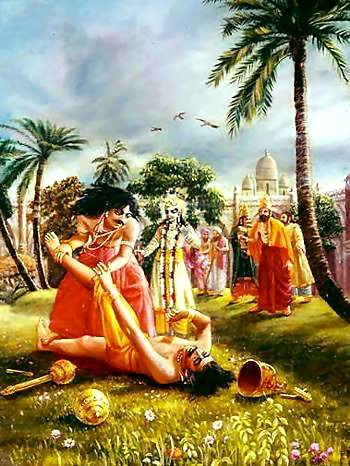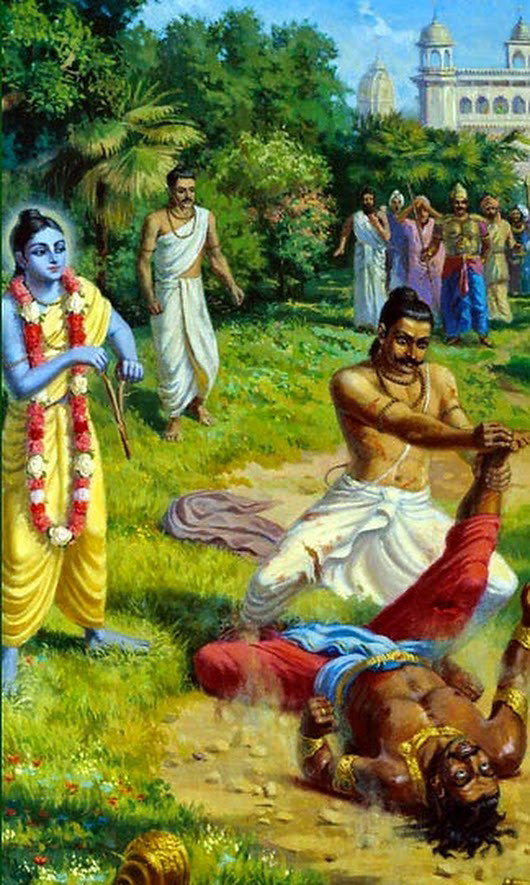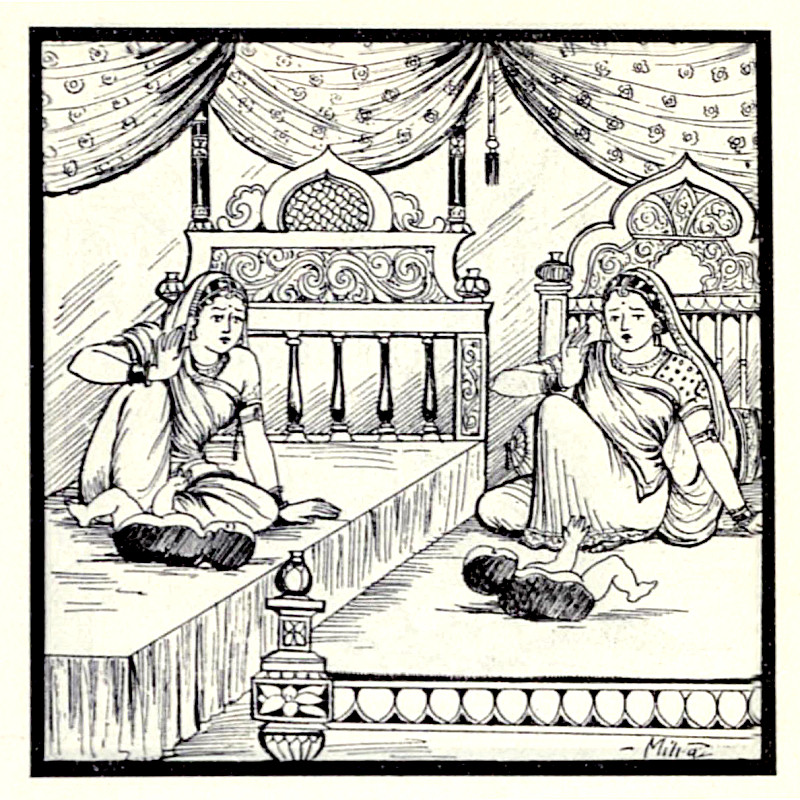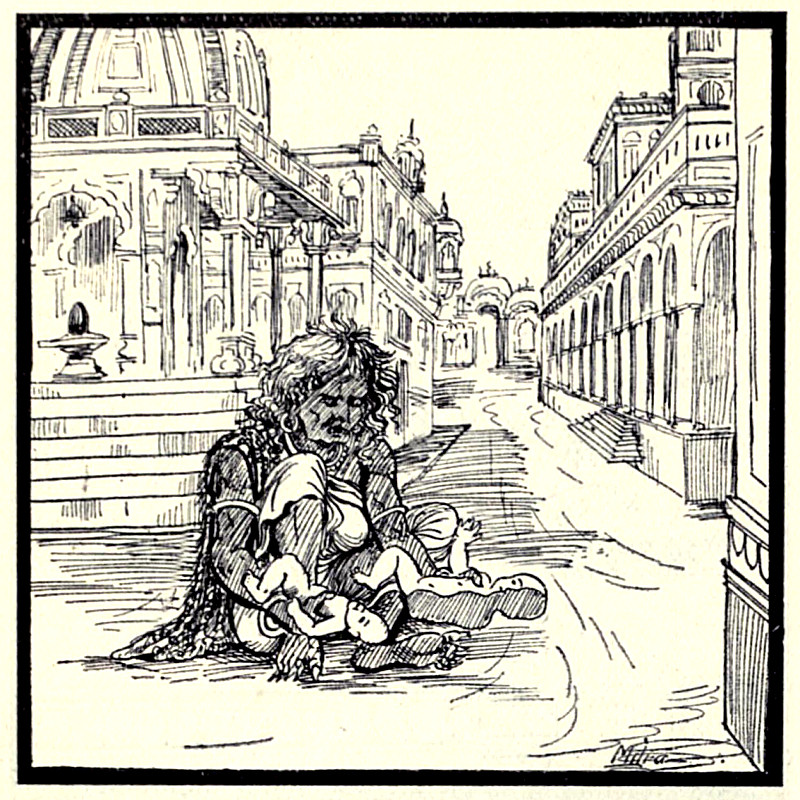Jarasandha Vaisnava — being killed by Bhima
Through the womb of another wife, Bṛhadratha begot two halves of a son. When the mother saw those two halves she rejected them, but later a she-demon named Jarā playfully joined them and said, “Come to life, come to life!” Thus the son named Jarāsandha was born. The King was very pleased with the she-demon and wanted to reward her according to her desire. The she-demon expressed her desire that the child be named after her, and thus the child was surnamed Jarāsandha, or one who was joined by Jarā, the she-demon. (SB 9.22.8) (SB 1.15.9)
JARASANDHA-VAISNAVA
Compiled by Mahesh Raja
740302mw.may Conversations
Prabhupada: Yes. He, he was worshiping Visnu at home, and he was trying to kill Krsna. SIMILARLY, THERE ARE MANY VAISNAVAS LIKE JARASANDHA –APPARENTLY WORSHIPING VISNU– BUT TRYING TO KILL KRSNA. JARASANDHA-VAISNAVA.
Jayapataka: So what is the value of such worship of Visnu?
Prabhupada: Eh?
Jayapataka: SO WHAT IS THE BENEFIT OF SUCH WORSHIP OF VISNU? JARASANDHA WORSHIP?
Prabhupada: THEY WILL GET MATERIAL OPULENCE. ASURAS, THEY WANT MATERIAL OPULENCE. THEY, THEY DO NOT UNDERSTAND WHAT IS SPIRITUAL LIFE OR SPIRITUAL HAPPINESS, WHAT IS DEVOTIONAL SERVICE. NEITHER THEY’D LIKE TO UNDERSTAND. Which way?
740408mw.bom Conversations
Prabhupada: (chants japa) (break). They’ll talk of Krsna, so many things but they’re not devotees. Just like Kamsa. They may talk of Krsna or think of Krsna, but they don’t accept Krsna as the Supreme. Therefore they are demons. This is the test. They’ll read Bhagavad-gita, but they’ll not accept Krsna as the Supreme. And that is the demonic. mayayapahrta-jnana asurim bhavam asritah. Because they are demons, therefore their so-called knowledge is useless. Apahrta-jnana. And apparently, they seem to be very learned scholar, but there is no knowledge. There is no knowledge. This is the demonic… Just like Ravana. He was very much advanced student in Vedic literature. But he was a demon. So simply by studying Vedas one does not become out of the jurisdiction of demons. JUST LIKE JARASANDHA. HE WAS ALSO WORSHIPING VISNU. BUT HE WAS A DEMON. HE WAS A DEMON. HIS PURPOSE WAS DIFFERENT. The yajnic brahmanas, they also could not understand Krsna. So this is the crucial test. If one does not understand Krsna and become submissive to surrender, he remains a demon, however big scholar he may be.
The Author Receives the Orders of Krsna and Guru
CC Adi 8.8 – TEXT 8
pūrve yaiche jarāsandha-ādi rāja-gaṇa
veda-dharma kari’ kare viṣṇura pūjana
SYNONYMS:
pūrve—formerly; yaiche—as it was; jarāsandha—King Jarāsandha; ādi—heading; rāja-gaṇa—kings; veda-dharma—performance of Vedic rituals; kari‘-doing; kare—does; viṣṇura—of Lord Viṣṇu; pūjana—worship.
TRANSLATION:
Formerly kings like Jarāsandha [the father-in-law of Kaṁsa] strictly followed the Vedic rituals, thus worshiping Lord Viṣṇu.
PURPORT:
In these verses the author of Śrī Caitanya-caritāmṛta, Kṛṣṇadāsa Kavirāja Gosvāmī, is very seriously stressing the importance of worship of the Pañca-tattva. IF ONE BECOMES A DEVOTEE OF GAURASUNDARA OR KṚṢṆA BUT DOES NOT GIVE IMPORTANCE TO THE PAÑCA-TATTVA (ŚRĪ-KṚṢṆA-CAITANYA PRABHU-NITYĀNANDA ŚRĪ-ADVAITA GADĀDHARA ŚRĪVĀSĀDI-GAURA-BHAKTA-VṚNDA), HIS ACTIVITIES ARE CONSIDERED TO BE OFFENSES, OR, IN THE WORDS OF ŚRĪLA RŪPA GOSVĀMĪ, UTPĀTA (DISTURBANCES). One must therefore be ready to offer due respects to the Pañca-tattva before becoming a devotee of Lord Gaurasundara or of Śrī Kṛṣṇa, the Supreme Personality of Godhead.
CC Adi 8.9 – TEXT 9
kṛṣṇa nāhi māne, tāte daitya kari’ māni
caitanya nā mānile taiche daitya tāre jāni
SYNONYMS
kṛṣṇa—Lord Kṛṣṇa; nāhi—does not; māne—accept; tāte—therefore; daitya—demon; kari’ māni—we accept; caitanya—Lord Śrī Caitanya Mahāprabhu; nā—without; mānile—accepting; taiche—similarly; daitya—demon; tāre—to him; jāni—we know.
TRANSLATION
One who does not accept Kṛṣṇa as the Supreme Personality of Godhead is certainly a demon. Similarly, anyone who does not accept Śrī Caitanya Mahāprabhu as Kṛṣṇa, the same Supreme Lord, is also to be considered a demon.
PURPORT
Formerly there were kings like Jarāsandha who strictly followed the Vedic rituals, acted as charitable, competent kṣatriyas, possessed all kṣatriya qualities and were even obedient to the brahminical culture but who did not accept Kṛṣṇa as the Supreme Personality of Godhead. Jarāsandha attacked Kṛṣṇa many times, and each time, of course, he was defeated. Like Jarāsandha, any man who performs Vedic rituals but does not accept Kṛṣṇa as the Supreme Personality of Godhead must be considered an asura, or demon. Similarly, one who does not accept Śrī Caitanya Mahāprabhu as Kṛṣṇa Himself is also a demon. This is the conclusion of authoritative scriptures. Therefore, both so-called devotion to Gaurasundara without devotional service to Kṛṣṇa and so-called kṛṣṇa-bhakti without devotional service to Gaurasundara are nondevotional activities. If one wants to be successful on the path of Kṛṣṇa consciousness, he must be thoroughly conscious of the personality of Gaurasundara as well as the personality of Kṛṣṇa. Knowing the personality of Gaurasundara means knowing the personalities of śrī-kṛṣṇa-caitanya prabhu-nityānanda śrī-advaita gadādhara śrīvāsādi-gaura-bhakta-vṛnda. The author of Śrī Caitanya-caritāmṛta, pursuant to the authorities, stresses this principle for perfection in Kṛṣṇa consciousness.

On the twenty-eighth day, Bhīmasena told Kṛṣṇa, “My dear Kṛṣṇa, I must frankly admit that I cannot conquer Jarāsandha.” Lord Kṛṣṇa, however, knew the mystery of the birth of Jarāsandha. Jarāsandha was born in two different parts from two different mothers. When his father saw that the baby was useless, he threw the two parts in the forest, where they were later found by a black-hearted witch named Jarā. She managed to join the two parts of the baby from top to bottom. Knowing this, Lord Kṛṣṇa therefore also knew how to kill him. He gave hints to Bhīmasena that since Jarāsandha was brought to life by the joining of the two parts of his body, he could be killed by the separation of these two parts. Thus Lord Kṛṣṇa transferred His power into the body of Bhīmasena and informed him of the device by which Jarāsandha could be killed. Lord Kṛṣṇa immediately picked up a twig from a tree and, taking it in His hand, bifurcated it. In this way He hinted to Bhīmasena how Jarāsandha could be killed. Lord Kṛṣṇa, the Supreme Personality of Godhead, is omnipotent, and if He wants to kill someone, no one can save that person. Similarly, if He wants to save someone, no one can kill him. (KB/2/17)
A plan was adpted whereby Kṛṣṇa, Bhīma and Arjuna together went to Jarāsandha in the dress of poor brāhmaṇas and begged charity from him. Jarāsandha never refused charity to any brāhmaṇa, and thus he readily agreed to fight with Bhīma alone. (SB 1.15.9)
TRANSLATION
Your respectable younger brother, who possesses the strength of ten thousand elephants, killed, by His grace, Jarāsandha, whose feet were worshiped by many kings. These kings had been brought for sacrifice in Jarāsandha’s Mahābhairava-yajña, but they were thus released. Later they paid tribute to Your Majesty. (SB 1.15.9)
PURPORT
Jarāsandha was a very powerful king of Magadha, and the history of his birth and activities is also very interesting. His father, King Bṛhadratha, was also a very prosperous and powerful King of Magadha, but he had no son, although he married two daughters of the King of Kāśī. Being disappointed in not getting a son from either of the two queens, the King, along with his wives, left home to live in the forest for austerities, but in the forest he was blessed by one great ṛṣi to have a son, and he gave him one mango to be eaten by the queens.
Jarāsandha’s birth as two halves — Jara the she-demon merges the two halves
The queens did so and were very soon pregnant. The King was very happy to see the queens bearing children, but when the ripe time approached, the queens delivered one child in two parts, one from each of the queens’ wombs. The two parts were thrown in the forest, where a great she-demon used to live, and she was glad to have some delicate flesh and blood from the newly born child. Out of curiosity she joined the two parts, and the child became complete and regained life. The she-demon was known as Jarā, and being compassionate on the childless King, she went to the King and presented him with the nice child, The King was very pleased with the she-demon and wanted to reward her according to her desire. The she-demon expressed her desire that the child be named after her, and thus the child was surnamed Jarāsandha, or one who was joined by Jarā, the she-demon. In fact, this Jarāsandha was born as one of the parts and parcels of the demon Vipracitti. The saint by whose benedictions the queens bore the child was called Candra Kauśika, who foretold of the child before his father Bṛhadratha.
Since he possessed demoniac qualities from birth, naturally he became a great devotee of Lord Śiva, who is the lord of all ghostly and demoniac men. Rāvaṇa was a great devotee of Lord Śiva, and so also King Jarāsandha. He used to sacrifice all arrested kings before Lord Mahābhairava (Śiva) and by his military power he defeated many small kings and arrested them to butcher before Mahābhairava. There are many devotees of Lord Mahābhairava, or Kālabhairava, in the province of Bihar, formerly called Magadha. Jarāsandha was a relative of Kaṁsa, the maternal uncle of Kṛṣṇa, and therefore after Kaṁsa’s death King Jarāsandha became a great enemy of Kṛṣṇa, and there were many fights between Jarāsandha and Kṛṣṇa. Lord Kṛṣṇa wanted to kill him, but He also wanted that those who served as military men for Jarāsandha might not be killed. Therefore a plan was adopted to kill him. Kṛṣṇa, Bhīma and Arjuna together went to Jarāsandha in the dress of poor brāhmaṇas and begged charity from King Jarāsandha. Jarāsandha never refused charity to any brāhmaṇa, and he performed many sacrifices also, yet he was not on a par with devotional service. Lord Kṛṣṇa, Bhīma and Arjuna asked Jarāsandha for the facility of fighting him, and it was settled that Jarāsandha would fight with Bhīma only. So all of them were both guests and combatants of Jarāsandha, and Bhīma and Jarāsandha fought every day for several days. Bhīma became disappointed, but Kṛṣṇa gave him hints about Jarāsandha’s being joined together as an infant, and thus Bhīma dissected him again and so killed him. All the kings who were detained in the concentration camp to be killed before Mahābhairava were thus released by Bhīma. Feeling thus obliged to the Pāṇḍavas, they paid tribute to King Yudhiṣṭhira.
http://www.krishnalilas.com/71-the-liberation-of-king-jarasandha.htm










pamho
agtacbsp,
yes we are completely agree with the sastra caksusa many demons worship sri krsna only due to selfish desires we dont needs to claim who they are because its very clear to recognise them through their disgusting qualities coming in from demonic backgrounds history,
actually all those big donkey who got initiated outside srila prabhupada final order are demons although they got plenty of salagram silas by chanting harinam cintamani maha mantra but they will never get the param vijayate sri krsna sankirtanam because we must chant hkmm with srila prabhupada guidance and not with the nasty guru hoaxes therefore all these bogus and demons will get destroyed through sri kalo smi without go back home in golokera prema dhana harinama sankirtana
agtsp
ys haribol
What we see today in ISKCON circles is many JARASANDHA-VAISNAVAS they want MONEY. These people are NOT after Srila Prabhupada’s Ritvik System. In the name of doing for Srila Prabhupada they MANIPULATE and PLUNDER the devotees:
SB 4.19.37 P King Prthu’ s One Hundred Horse Sacrifices
When King Prthu is described as an incarnation of Lord Visnu, it should be understood that he is a saktyavesa-avatara, part and parcel of Lord Visnu, and is specifically empowered by Him. Any living being acting as the incarnation of Lord Visnu is thus empowered by Lord Visnu to preach the bhakti cult. Such a person can act like Lord Visnu and defeat demons by arguments and preach the bhakti cult exactly according to the principles of sastra. As indicated in Bhagavad-gita, whenever we find someone extraordinary preaching the bhakti cult, we should know that he is especially empowered by Lord Visnu, or Lord Krsna. As confirmed in Caitanya-caritamrta (Antya 7.11), krsna-sakti vina nahe tara pravartana: one cannot explain the glories of the holy name of the Lord without being specifically empowered by Him. If one criticizes or finds fault with such an empowered personality, one is to be considered an offender against Lord Visnu and is punishable. EVEN THOUGH SUCH OFFENDERS MAY DRESS AS VAISNAVAS WITH FALSE TILAKA AND MALA, THEY ARE NEVER FORGIVEN BY THE LORD IF THEY OFFEND A PURE VAISNAVA. THERE ARE MANY INSTANCES OF THIS IN THE SASTRAS.
Madhya 1.218 The Later Pastimes of Lord Sri Caitanya Mahaprabhu
Srila Narottama dasa Thakura says, chadiya vaisnava seva nistara payeche keba: unless one serves a Vaisnava, he cannot be delivered. The spiritual master initiates the disciple to deliver him, and if the disciple executes the order of the spiritual master and does not offend other Vaisnavas, his path is clear. Consequently Sri Caitanya Mahaprabhu requested all the Vaisnavas present to show mercy toward the two brothers, Rupa and Sanatana, who had just been initiated by the Lord. When a Vaisnava sees that another Vaisnava is a recipient of the Lord’s mercy, he becomes very happy. Vaisnavas are not envious. If a Vaisnava, by the mercy of the Lord, is empowered by Him to distribute the Lord’s holy name all over the world, other Vaisnavas become very joyful–that is, if they are truly Vaisnavas. One who is envious of the success of a Vaisnava is certainly not a Vaisnava himself, but an ordinary mundane man. Envy and jealousy are manifested by mundane people, not by Vaisnavas. Why should a Vaisnava be envious of another Vaisnava who is successful in spreading the holy name of the Lord? An actual Vaisnava is very pleased to accept another Vaisnava who is bestowing the Lord’s mercy. A MUNDANE PERSON IN THE DRESS OF A VAISNAVA SHOULD NOT BE RESPECTED BUT REJECTED. THIS IS ENJOINED IN THE SASTRA (UPEKSA). THE WORD UPEKSA MEANS NEGLECT. ONE SHOULD NEGLECT AN ENVIOUS PERSON. A preacher’s duty is to love the Supreme Personality of Godhead, make friendships with Vaisnavas, show mercy to the innocent and reject or neglect those who are envious or jealous. THERE ARE MANY JEALOUS PEOPLE IN THE DRESS OF VAISNAVAS IN THIS KRSNA CONSCIOUSNESS MOVEMENT, AND THEY SHOULD BE COMPLETELY NEGLECTED. THERE IS NO NEED TO SERVE A JEALOUS PERSON WHO IS IN THE DRESS OF A VAISNAVA. When Narottama dasa Thakura says chadiya vaisnava seva nistara payeche keba, he is indicating an actual Vaisnava, not an envious or jealous person in the dress of a Vaisnava.
Madhya 1.220 The Later Pastimes of Lord Sri Caitanya Mahaprabhu
This behavior is indicative of real Vaisnavas. When they saw that Rupa and Sanatana were fortunate enough to receive the mercy of the Lord, they were so pleased that they all congratulated the two brothers. A jealous person in the dress of a Vaisnava is not at all happy to see the success of another Vaisnava in receiving the Lord’s mercy. UNFORTUNATELY IN THIS AGE OF KALI THERE ARE MANY MUNDANE PERSONS IN THE DRESS OF VAISNAVAS, AND SRILA BHAKTIVINODA THAKURA HAS DESCRIBED THEM AS DISCIPLES OF KALI. HE SAYS, KALI-CELA. HE INDICATES THAT THERE IS ANOTHER VAISNAVA, A PSEUDOVAISNAVA WITH TILAKA ON HIS NOSE AND KANTHI BEADS AROUND HIS NECK. SUCH A PSEUDOVAISNAVA ASSOCIATES WITH MONEY AND WOMEN AND IS JEALOUS OF SUCCESSFUL VAISNAVAS. ALTHOUGH PASSING FOR A VAISNAVA, HIS ONLY BUSINESS IS EARNING MONEY IN THE DRESS OF A VAISNAVA. BHAKTIVINODA THAKURA THEREFORE SAYS THAT SUCH A PSEUDOVAISNAVA IS NOT A VAISNAVA AT ALL BUT A DISCIPLE OF KALI-YUGA. A disciple of Kali cannot become an acarya by the decision of some high court. Mundane votes have no jurisdiction to elect a Vaisnava acarya. A Vaisnava acarya is self-effulgent, and there is no need for any court judgment. A false acarya may try to override a Vaisnava by a high-court decision, but Bhaktivinoda Thakura says that he is nothing but a disciple of Kali-yuga.
Madhya 1.218 The Later Pastimes of Lord Sri Caitanya Mahaprabhu
Srila Narottama dasa Thakura says, chadiya vaisnava seva nistara payeche keba: unless one serves a Vaisnava, he cannot be delivered. The spiritual master initiates the disciple to deliver him, and if the disciple executes the order of the spiritual master and does not offend other Vaisnavas, his path is clear. Consequently Sri Caitanya Mahaprabhu requested all the Vaisnavas present to show mercy toward the two brothers, Rupa and Sanatana, who had just been initiated by the Lord. When a Vaisnava sees that another Vaisnava is a recipient of the Lord’s mercy, he becomes very happy. Vaisnavas are not envious. If a Vaisnava, by the mercy of the Lord, is empowered by Him to distribute the Lord’s holy name all over the world, other Vaisnavas become very joyful–that is, if they are truly Vaisnavas. One who is envious of the success of a Vaisnava is certainly not a Vaisnava himself, but an ordinary mundane man. Envy and jealousy are manifested by mundane people, not by Vaisnavas. Why should a Vaisnava be envious of another Vaisnava who is successful in spreading the holy name of the Lord? An actual Vaisnava is very pleased to accept another Vaisnava who is bestowing the Lord’s mercy. A mundane person in the dress of a Vaisnava should not be respected but rejected. This is enjoined in the sastra (upeksa). The word upeksa means neglect. One should neglect an envious person. A preacher’s duty is to love the Supreme Personality of Godhead, make friendships with Vaisnavas, show mercy to the innocent and reject or neglect those who are envious or jealous. There are many jealous people in the dress of Vaisnavas in this Krsna consciousness movement, and they should be completely neglected. THERE IS NO NEED TO SERVE A JEALOUS PERSON WHO IS IN THE DRESS OF A VAISNAVA. When Narottama dasa Thakura says chadiya vaisnava seva nistara payeche keba, he is indicating an actual Vaisnava, not an envious or jealous person in the dress of a Vaisnava.
SB 8.9.28 P The Lord Incarnates as Mohini-Murti
THERE ARE MANY KARMIS IN THE DRESS OF DEVOTEES, BUT THE SUPREME PERSONALITY OF GODHEAD CAN DETECT THEIR PURPOSE. The karmis want to use the property of the Lord for their selfish sense gratification, but a devotee endeavors to use the Lord’s property for God’s service.
pamho
agtacbsp
almost everyone had bad experience in the material world and unless one get completely disgusting about this material world by stipping to lord over krsna property one has still to suffer a lot the nasty duality of this unwanted huge and stink toilet compare very often to this world where all the biped uncivilised citizens are swearing until their last breath anyway we are safe by srila prabhupada special mercy
agtsp
ys haribol
” A devotee on the topmost platform of devotional service always humbly thinks that he is not rendering any devotional service. He thinks that he is poor in devotional service and that his body is material. On the other hand, those known as the sahajiyās foolishly think that their material bodies are transcendental. Because of this, they are always bereft of the association of pure devotees, and thus they cannot behave like Vaiṣṇavas.”
We read from the article that Jarāsandha never refused charity to any brāhmaṇa, and he performed many sacrifices also, yet he was not on a par with devotional service. And in the same manner it can be said that Maharathi Karan aka Daan Veer Karan was also very charitable personality but he did not enter in to the Devotional service to Shri Krishna and yet both the personalities are on a different category in the dress (behaviour ) of the Vaisnavas. Jarasandha is totally envious on his behaviour whereas Shri Karan remain non envious to the Lord’s devotional service because both of their purpose of such behaviour was totally different.
So this way so many personalities in the dress (behaviour) of a Vaisnava remain always bereft of the association of the Pure Devotees of the Lord and thus, such type of behaviour is never considered as a Vaisnavas as per the conclusion of the Shastras, Sadhus and the GURU His Divine Grace Srila Prabhupada’s VANI.
OM TAT SAT.
Hare Krishna. All Glories to Srila Prabhupada.
Thanks, Mahesh Raya,for all the wonderful and enlivening purports.
Eating and drinking the blood of babies:
The two parts were thrown in the forest, where a great she-demon used to live, and she was glad to have some delicate flesh and blood from the newly born child…
Human sacrifices:
Rāvaṇa was a great devotee of Lord Śiva, and so also King Jarāsandha. He used to sacrifice all arrested kings before Lord Mahābhairava (Śiva) and by his military power he defeated many small kings and arrested them to butcher before Mahābhairava…
All the kings who were detained in the concentration camp to be killed before Mahābhairava were thus released by Bhīma….
===
A normal, good-hearted person cannot imagine things like this to be real, to actually be happening today and shrugs it off as allegorical. No matter how many times one reads the Bhagavatam there are always new aspects to it. This particular aspect is so disturbing as we can see these days how real it is, how actually it is happening right under our noses. Five years ago one mostly did not pay much attention to this aspect as we can see in the comments. Aztec culture and so on…yes, one has heard about that, but that was long ago….5000 years ago…
The Bhagavatam and Srila Prabhupada translations continue to surprise again and again, more and more, with their accuracy and their meticulously detailed descriptions of human natures, fallacies and tendencies. Every time one starts over again from Canto One there are new aspects to be discovered and something new is to be learned, it never gets boring. On the contrary, now we read the actual, latest “TODAY NEWS” from the pages of the Bhagavatam, almost like yesterday’s newspaper. The difference is the “BHAGAVATAM NEWS” are real, the others are FAKE.
===